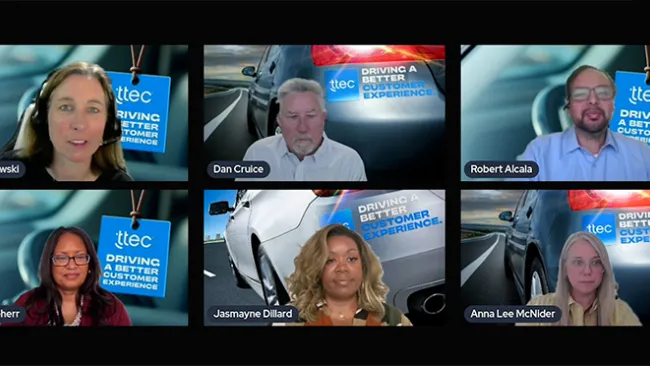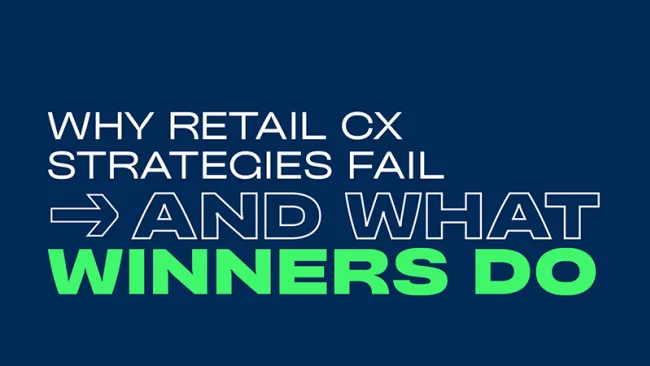Retail is an industry in constant evolution. Liz Glagowski and TTEC Head of Retail Jon Stough discuss challenges and opportunities for retailers to improve the customer experience and engage employees to shine as valuable brand ambassadors.
Key takeaways:
- Retail brands are struggling to balance experience versus cost and efficiency versus issue resolution.
- There's a huge opportunity for retailers to improve customer experience by improving employee engagement.
- Consider working with a CX partner to improve core competencies, scale quickly, provide associates with the right tools, and reduce costs with international expansion.
Transcript
Liz Glagowski: Hi everyone I'm Liz Glagowski and today we'll be chatting about what comes next for employee engagement and retention in the retail industry with me for today's conversation is Jon Stough who leads the retail practice here at t tech welcome John.
Jon Stough: Hello. Nice to see you today. Hi.
LG: I'm interested to talk to you today Jon because retail is one of the industries that was the most impacted by the pandemic and companies are trying now to scramble both to recover from what happened you the last two years as well as set themselves up for some long-term success. What are some challenges that you're seeing retailers face, both when it comes to hiring and retaining employees as well as just delivering that experience that customers are looking for these days?
JS: Yeah, it's ah it's a great question and I'm actually excited to be talking about it today because it's pretty timely for me I was at a conference just ah, a week and a half ago at this point and it was not fully focused on retail but focused on the contact center and customer experience. But there were quite a few retailers there and I got to spend a lot of time with them which allowed me to explore some of these topics with them.
There were 2 things that really stood out to me. One of them is around the efficiency metrics that that are specific to customer experience and for that matter the call center and I know it's an age-old question. You know how important are they, but the fact that it's very relevant today makes me think that. It's getting a resurgence and in companies exploring how that really is affecting their overall customer experience and it's a tough question.
I think as CX leaders especially over the contact centers, we have strong opinions around efficiency metrics but leadership but above often has varying or different opinions on that and so I think that that it's something that retailers are really taking a deep look at right now and how it fits into their call center approach and their customer experience approach.
What we like to do is to really look at it from 4 variables: experience versus cost, and efficiency versus the resolution of the issue. What I've found is that when we really hone in on these kind of 4 components, we're able to help companies find a balance for what makes sense for them in terms of achieving the best outcomes across these four variables.
The other one that that I saw that came up a lot is channel mix. There are a number of reasons why, but as we probably most of us have heard in the retail industry as a whole There's a big discussion around digitalization and transforming digitally for retailers. But I think a lot of it's coming down the channel mix and there's about a couple reasons.
One is the experience that we're delivering back to our customers and then considering cost and deflection and how that equates to the overall customer experience.
But then one of the biggest ones I think is the changing demographics specific to retail and as we've got newer and younger buyers coming into the market. It's really forcing retailers to consider how are you delivering your services to your customer base. So those are the big areas that that I see really top of mind right now across retail.
LG: What are some things maybe from the employee experience side and the customer experience side that you're seeing?
JS: From the employee experience side there are 3 key areas. First, a lot of retailers need to ask is how are you measuring your employee experience. There are the traditional surveys and things of that nature. But then when you look at how you're measuring it I think you also have to look at how often and when you are measuring customer or employee experience. If you are doing it once a year, you're going to certainly see different results than if you pulse it multiple times through the year. Also look at when in the employee lifecycle you're measuring it throughout the year.
But the ways I think retailers are tackling it is number 1 on tools. So what tools are the employees having to work within to deliver customer experience for the brands and are you able to reduce those tools or you're able to simplify how they're used. That's a great way to affect employee experience and engagement.
Management is another top area that we always look at as an organization. You know that old adage that people don't leave jobs. They leave leaders or they leave their managers. So we really focus heavily on the quality of management and how they are engaging with the employees.
And then last one I think is empowerment and specific to CX. It's a big one because the life of a customer experience employee or agent is in delivering good quality experience. So when you've empowered that agent to have the ability to make change, then you improve their overall experience.
Just give you a quick idea of how important I think this is and the industry as a whole, I read something recently that said that top engaged companies with top engaged employees deliver 147% better results than companies with low employee engagement. But here's the real kicker—when you then look at the employee in the customer experience industry as a whole only 31.5% say they feel engaged in their job. So there's a huge opportunity here for retailers and an all companies for that matter to improve customer experience through improving their employee engagement.
LG: One way that some companies are helping to get to those better engaged employees and deliver on those 3 points that you talked about is working with a customer experience partner. What are some benefits or metrics that a brand may want to look at when trying to determine whether they should be working with a partner or how they may be wanting to work with a partner?
JS: Companies making this decision around are first of all core competency. So you know thinking about your employee base. Do you have the expertise to deliver the customer experience that that you as a company want to deliver or that your customer base is expecting? If you do, then you know focusing on these customer experience measurements and improving that is a great opportunity. But if you determine that that's not where your expertise lies, then there's a big opportunity there to talk to a partner.
I mentioned earlier demographics and buyers changing that changes your approach to customer experience as well. And for example, I mentioned channels earlier with millennials and Gen z's looking to be the top purchasers and retail specifically for higher end products by 2025. It's a fast and quickly changing environment. So if you not only don't have the right tools and the expertise, then that's another reason you would certainly want to explore a partnership.
The other 2 big ones are scale. As companies grow quickly, they tend to find that that supporting customer experiences specifically in the contact center starts to become a question as of whether it's the right thing they should be putting their focus on and so the other area is that scale becomes important is. It's a big push for 24x7 support these days and maybe it's not having agents in place but it's a full customer experience model that supports the 24x7x365 support.
Another good opportunity to explore partner opportunities would be international expansion that that sometimes takes companies out of their comfort zone and then of the other large categories. There's always a cost reduction typically working with the partner can give you high quality customer experience but can help you reduce your overall cost.
And so then all of these you know components have ah a piece of the overall employee engagement component embedded in them, but usually not the only reason that that companies start to look for a partner.
LG: It's an evolving industry and companies have to move quickly and there's really not a lot of room for error. So these are some really good points to be making about how as demographics change and as the market itself changes. Jon thanks so much for taking some time with us today. It's it's been some really great insight. Thank you.














